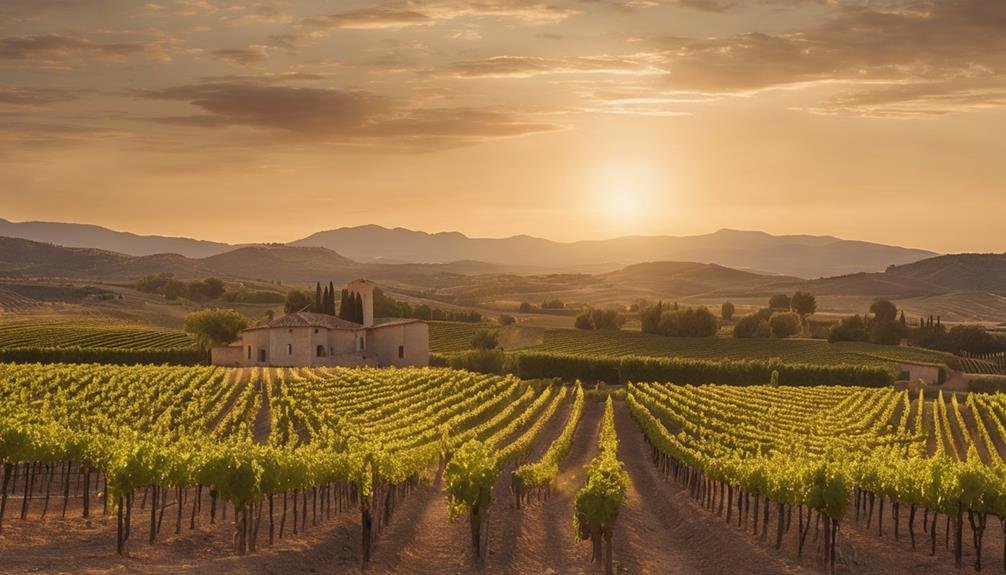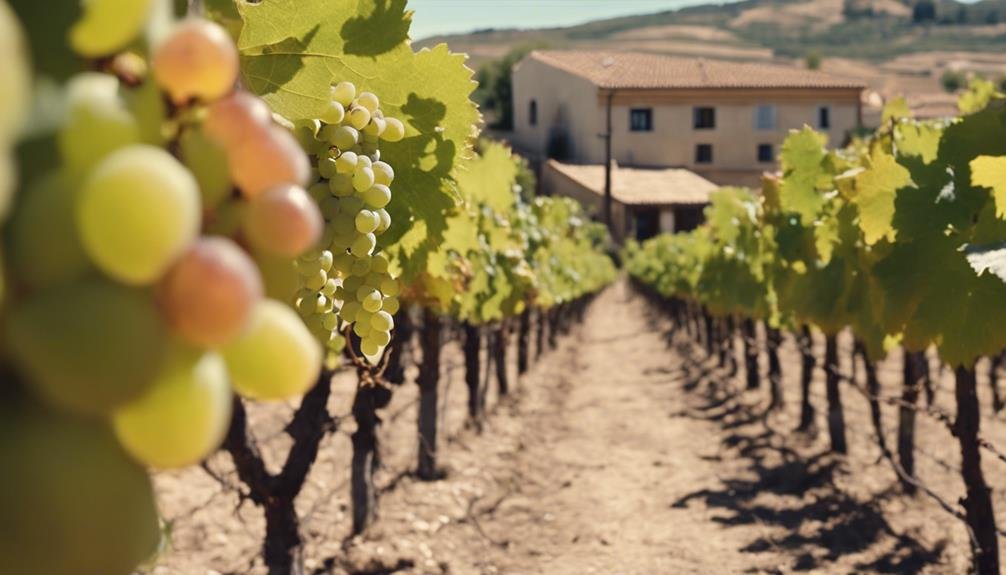Verdejo, Rueda's indigenous white grape, boasts a rich legacy spanning centuries. Thriving in the region's arid climate, Verdejo produces a spectrum of wines from crisp to complex, known for its high acidity and aromatic charm that complements various dishes. Rueda's unique conditions, with hot days and cool nights, bolster Verdejo's balanced development. The blend of sandy-clay and clay soils, influenced by the Duero River, elevates the grape's quality. Verdejo's century-old history in Rueda, coupled with its global appeal, underlines its exclusivity and significance in the world of winemaking. Discover the intriguing depth of Verdejo's legacy in Rueda.
Ruedas Indigenous White Grape: Verdejo
Verdejo, the indigenous white grape of Rueda, has long been revered for its exceptional adaptation to the region's arid and extreme climate. This grape's versatility shines through in its ability to produce a range of wines, from crisp and invigorating to bold and complex.
Verdejo's high acidity and aromatic profile make it a perfect match for various food pairings, including seafood dishes like ceviche or grilled shrimp, as well as light salads and creamy cheeses. Its herbal and citrus notes complement a wide array of flavors, making Verdejo a go-to choice for many wine enthusiasts.
Whether enjoyed on its own or paired with a delicious meal, Verdejo from Rueda promises a delightful drinking experience.
Richness Revealed: Ruedas Conditions
How do the unique conditions in Rueda contribute to the richness of its wines?
Rueda's conditions play a vital role in shaping the profound richness of its wines. The region's climate impact, characterized by hot days and cool nights, helps Verdejo grapes develop a balance of sugar and acidity, essential for producing complex and flavorful wines.
Rueda's sandy-clay and clay soils, influenced by the Duero River Basin, contribute to the grapevines' ability to thrive and produce high-quality fruit. Additionally, the raja's influence, a cold wind that sweeps through the vineyards, helps maintain the grapes' acidity levels, adding a distinct freshness to the wines.
Altogether, these factors create the ideal environment for Verdejo to flourish, resulting in the rich and distinctive wines that Rueda is renowned for.
Aging Potential of Rueda Wines

The aging potential of Rueda wines reveals an intriguing development of flavors and complexities over time.
- Aging allows for flavor evolution, bringing out toasted almond and orange peel notes.
- Taste exploration can expose hidden nuances in Rueda wines aged for 5-8 years.
- Selecting Verdejo wines with high acidity and minimal oxidation is essential for successful aging.
- While Rueda wines are typically enjoyed young, aging can introduce new and exciting flavors.
- Experimenting with aging Rueda wines can provide unique tasting experiences, showcasing the versatility and depth of these wines.
Soil Influence on Verdejo Wines
Influenced by the distinctive soil compositions in the Rueda region, Verdejo wines exhibit a spectrum of flavors and textures that reflect the terroir's impact on grape cultivation. The soil impact on Verdejo wines is profound, shaping their flavor profiles in significant ways. Clay-based soils in Rueda produce wines that are richer with more texture, while sandy soils yield Verdejo wines with minerally flavors and higher aromatic intensity. This diversity in soil composition allows winemakers to craft a range of Verdejo wines, each unique in its expression and characteristics. Understanding the soil influence on Verdejo wines provides insight into the complexity and depth of flavors that can be experienced in each bottle.
| Soil Type | Flavor Profile |
|---|---|
| Clay-based | Rich, textured |
| Sandy | Minerally, aromatic |
Verdejos Unique Availability and History

Verdejo's remarkable scarcity beyond the Rueda region underscores its historical significance and desirability among wine connoisseurs.
- Verdejo's heritage in Rueda traces back over 1000 years, showcasing its deep-rooted tradition.
- The global appeal of Verdejo wines has led to cultivation in some regions outside Rueda, such as California and Virginia.
- Verdejo's unique characteristics, like its aromatic intensity and crisp acidity, contribute to its sought-after status.
- The rarity of Verdejo wines outside Rueda adds to their allure and exclusivity among wine enthusiasts.
- The historical importance of Verdejo in Rueda highlights its significance in the world of winemaking.
Frequently Asked Questions
How Does the Age of Verdejo Vines in Rueda Impact the Wines Quality?
The age of Verdejo vines in Rueda greatly influences wine quality. Older vines root deeply, mirroring terroir nuances in the grapes. This enhances complexity, richness, and depth in wines, fostering an evolution of flavor profiles unique to Rueda's vineyards.
What Are the Key Factors That Contribute to the Richness of Rueda Verdejo Wines?
The richness of Rueda Verdejo wines stems from the region's climate influence, fostering the development of intensely flavored grapes. Winemaking techniques, including controlled fermentation and lees stirring, further enhance the wine's complexity, resulting in a distinctive and high-quality product.
Can Aging Rueda Wines Reveal Flavors Different From Those in Young Wines?
Aging Rueda wines can reveal new flavor profiles distinct from young wines, showcasing the evolution and complexity of the wine. This process is influenced by vine age, enhancing quality and revealing nuanced characteristics over time.
How Do Clay-Based Soils in Rueda Influence the Texture of Verdejo Wines?
Clay influence on Rueda's Verdejo wines is pivotal in texture development. Clay-based soils enhance wine body and mouthfeel by encouraging deeper root penetration and water retention. This soil composition in vineyards impacts Verdejo's richness and complexity.
Why Is Verdejo Predominantly Found in Rueda and Considered Rare Outside the Region?
Verdejo is primarily found in Rueda due to its historical origins and unique adaptability to the region's climate and soils. International Verdejo trends indicate growing interest, yet its rarity outside Rueda persists, enhancing its allure.
Conclusion
Verdejo's valuable virtues in Rueda reveal a rich legacy that lures wine enthusiasts with its nuanced notes and rare availability.
The region's extreme climate and unique soil composition contribute to the exceptional aging potential of Verdejo wines, showcasing their depth and complexity over time.
As Verdejo continues to captivate connoisseurs worldwide, its distinctive character and limited production underscore its status as a prized gem in the world of wine.